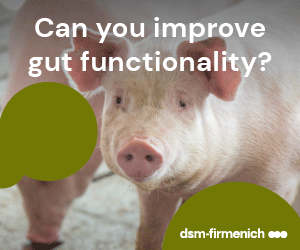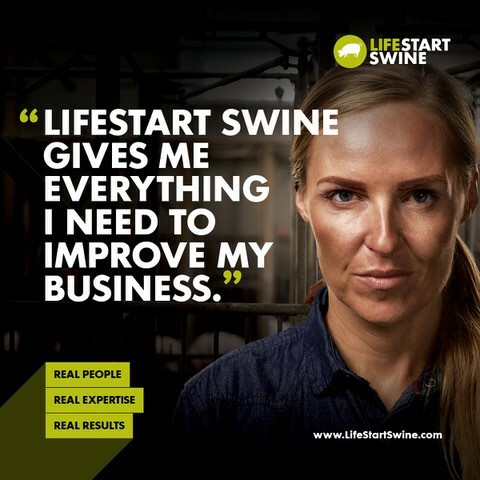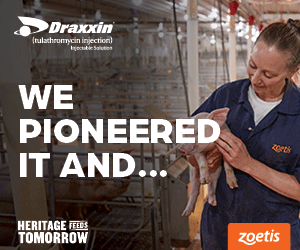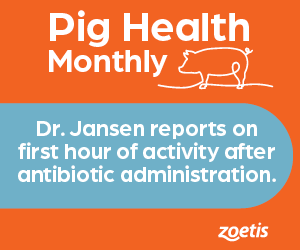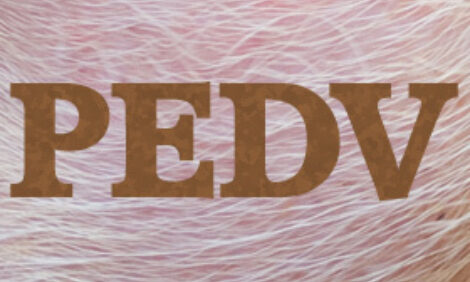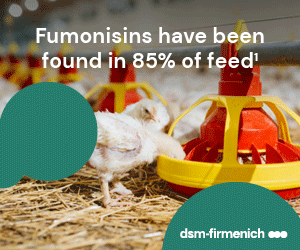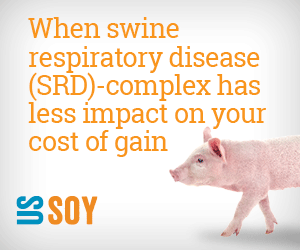



Antimicrobials and resistance in relation to veterinary medicines
By UK Pig Veterinary Society - In pig medicine antibiotics are used to restore the health and welfare of pigs in the face of disease challenge. The Pig Veterinary Society is a committed supporter of the rational and prudent use of antibiotics in pig production. The PVS has worked with the British Veterinary Association and the Responsible Use of Medicines in Agriculture Group to promote the responsible use of medicines.
The PVS has developed and circulated to its members guidelines for the use of antimicrobials in pig medicine which includes specific advice on fluoroquinolones. Scientific meetings of the PVS every spring and autumn highlight new developments and best practice in pig medicine.
Range of antibiotics limited
The range of antibiotics currently available for use is relatively limited. Furthermore, most of those used in livestock production have been available for several decades yet they remain effective. Veterinary surgeons regularly monitor the sensitivity to antibiotics of organisms isolated from sick pigs to ensure that the antibiotics used will be effective. If resistance to these antibiotics were as widespread as is implied, then there would be far greater lack of efficacy in the field.
Animals reared for meat have a finite period of growth, which ends with their slaughter. This provides an opportunity to use hygiene methods to prevent the possibility of perpetual transfer of bacteria between groups of animals and this may explain why the early antibiotics remain effective today.
Antibiotics are essential to reduce animal suffering. PVS also believes that whilst the first duty of the prescribing veterinarian is to relieve suffering, there is also an associated need to ensure that the prevalence of infectious disease in livestock is kept as low as possible for reasons of economics. The financial viability of a livestock enterprise has a significant bearing on animal welfare and any proposals that might raise the costs of treatment or reduce its availability should be given careful consideration.
Unconvinced
PVS remains unconvinced that there is a significant transfer of antibiotic resistance or antibiotic-resistant bacteria from animals to man. It is conceivable that the reverse may be true as in many cases resistance levels appear to be higher in organisms isolated from people. In each stage of the food chain that occurs after livestock or animal products leave the farm, there is opportunity for cross-contamination from and by humans to the livestock products being produced and during preparation in the kitchen.
PVS believes that before conclusions can be drawn about the contribution of antibiotic use in UK livestock to antibiotic resistance in human pathogens, reliable scientific data from further research are required on the following:
Surveillance
PVS is therefore in principle in agreement with surveillance in as much as it can contribute to the assessment of real risks, but it considers that there are many difficulties in such an exercise that could make interpretation of results difficult. PVS believes that if additional data are to be required for antibiotics and their use in the UK, the same requirements should exist in other livestock producing countries.
There seems to be little point in imposing extra measures at home if meat, eggs and dairy products continue to be imported in ever increasing amounts from abroad.
There is only limited data available on antimicrobial resistance in most countries.
Incidence lower in UK
The data presented on surveillance in the UK show that the incidence of resistance is lower than in other countries in which controls on the use of antimicrobials are less stringent.
International harmonisation and enforcement is especially important in the context of antibiotic resistance because it is a global phenomenon.
Source: UK Pig Veterinary Society - February 2002
Range of antibiotics limited
The range of antibiotics currently available for use is relatively limited. Furthermore, most of those used in livestock production have been available for several decades yet they remain effective. Veterinary surgeons regularly monitor the sensitivity to antibiotics of organisms isolated from sick pigs to ensure that the antibiotics used will be effective. If resistance to these antibiotics were as widespread as is implied, then there would be far greater lack of efficacy in the field.
Animals reared for meat have a finite period of growth, which ends with their slaughter. This provides an opportunity to use hygiene methods to prevent the possibility of perpetual transfer of bacteria between groups of animals and this may explain why the early antibiotics remain effective today.
Antibiotics are essential to reduce animal suffering. PVS also believes that whilst the first duty of the prescribing veterinarian is to relieve suffering, there is also an associated need to ensure that the prevalence of infectious disease in livestock is kept as low as possible for reasons of economics. The financial viability of a livestock enterprise has a significant bearing on animal welfare and any proposals that might raise the costs of treatment or reduce its availability should be given careful consideration.
Unconvinced
PVS remains unconvinced that there is a significant transfer of antibiotic resistance or antibiotic-resistant bacteria from animals to man. It is conceivable that the reverse may be true as in many cases resistance levels appear to be higher in organisms isolated from people. In each stage of the food chain that occurs after livestock or animal products leave the farm, there is opportunity for cross-contamination from and by humans to the livestock products being produced and during preparation in the kitchen.
PVS believes that before conclusions can be drawn about the contribution of antibiotic use in UK livestock to antibiotic resistance in human pathogens, reliable scientific data from further research are required on the following:
- The true frequency of transfer of antibiotic resistance from significant animal to significant human pathogens.
- The frequency of clinically significant circumstances where it can be demonstrated reliably that antibiotic resistance, which has originated in bacteria from animals as a result of the veterinary use of antibiotics, has caused clinical problems in humans.
- The degree to which animal pathogens, other than those such as salmonella and which are known to cause food-borne infection, actually colonise humans. It is understood that antibiotics are normally contra-indicated for the treatment of salmonella infections in humans.
- The contribution made to the pool of antibiotic resistance found in bacteria of humans in the UK (local resistance) by widespread contact with bacteria whilst travelling outside the UK, by contact with other people who have travelled outside the UK or from bacteria contained in or on food imported from outside the UK (global resistance) should be determined. It is understood that attitudes to the availability and use of antibiotics in other countries of the World vary considerably.
Surveillance
PVS is therefore in principle in agreement with surveillance in as much as it can contribute to the assessment of real risks, but it considers that there are many difficulties in such an exercise that could make interpretation of results difficult. PVS believes that if additional data are to be required for antibiotics and their use in the UK, the same requirements should exist in other livestock producing countries.
There seems to be little point in imposing extra measures at home if meat, eggs and dairy products continue to be imported in ever increasing amounts from abroad.
There is only limited data available on antimicrobial resistance in most countries.
Incidence lower in UK
The data presented on surveillance in the UK show that the incidence of resistance is lower than in other countries in which controls on the use of antimicrobials are less stringent.
International harmonisation and enforcement is especially important in the context of antibiotic resistance because it is a global phenomenon.
Source: UK Pig Veterinary Society - February 2002







